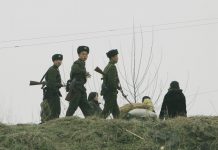
North Korea is moving forward with an excessive level of personnel changes in a push to achieve state-led projects.
On Mar. 8, a source inside North Korea told me that “in early March, the party committee of South Pyongan Province dismissed 12 officials from the regional industrial management office of the provincial people’s committeeNorth Korean people's committees are akin to local governmen... More and major agricultural enterprises, citing their failure to meet the targets of the 2023 development plan.”
The source explained that the individuals were punished under the pretext that “the policies of the Workers’ Party are the law of the nation and the rule of the country.”
I believe that North Korea’s recent economic trends confirm yet again that North Korea is a “command economy” run by the Workers’ Party. The party’s involvement in the economy weakens the power of markets given that resources are distributed according to the party’s policies. Therefore, the party’s intervention in the economy creates an environment in which individual economic decisions are suppressed in the name of the country’s development strategy. In sum, this means that the country’s markets are inflexible and the distribution of resources is extremely unbalanced.
Perhaps North Korea’s leadership has forgotten that it once advocated a socialist economy. Its inflexible planned economy is based on the principle of self-reliance and reflects the will of the Workers’ Party and its Supreme Leader. This same system has led to food shortages resulting in mass starvation and a dependence on China for even the most basic necessities. Not only does a rigid command economy make it impossible to predict economic trends, but history throughout the ages, from East to West, has proven that such a system destroys entire markets and leads to financial hardship.
The Workers’ Party had introduced a so-called socialist economic system that wreaked havoc on the country for 30 years between 1960 and 1990. Due to instability and negative economic growth, North Korea’s food rationing system was only implemented in times of crisis, and its eventual failure led to the starvation of millions of people.
Government must place less focus on national defense, more on the economy
At present, the party leadership is attempting to manipulate the economy by firing officials at will, but it should not overlook the fact that the economy can be made inflexible by party policies. There are also concerns that this command economy, based on the Kim Jong Un regime’s values of “self-reliance” and “strength through hardship,” could lead to another Arduous March, an unthinkable period of pain and suffering in North Korea’s history.
In the 2000s, the market economy took hold, and with it came opportunities to escape the rigidity of a socialist economic system. However, I believe that the reason North Korea is still mired in economic crisis is that the legacy of socialism is inextricably intertwined with the current economic system. In fact, the annual income of the average North Korean has fallen during the current economic crisis, a phenomenon that is another consequence of the command economy system.
Another problem is that the country’s markets are shrinking and consumption is falling as the Workers’ Party prioritizes national defense above all else. The party has complete control over both the composition of its workforce and the economy as a whole, and uses its authority to channel resources into its nuclear arsenal and the maintenance of the regime. North Korea’s leaders should remember that a nation is a complex network of people, land, and government, so when the Workers’ Party infringes on the livelihood of its people, it shakes the country to its core.
Translated by Audrey Gregg. Edited by Robert Lauler.
Daily NK works with a network of sources living in North Korea, China, and elsewhere. Their identities remain anonymous for security reasons. For more information about Daily NK’s network of reporting partners and information-gathering activities, please visit our FAQ page here.
Please send any comments or questions about this article to dailynkenglish@uni-media.net.

















